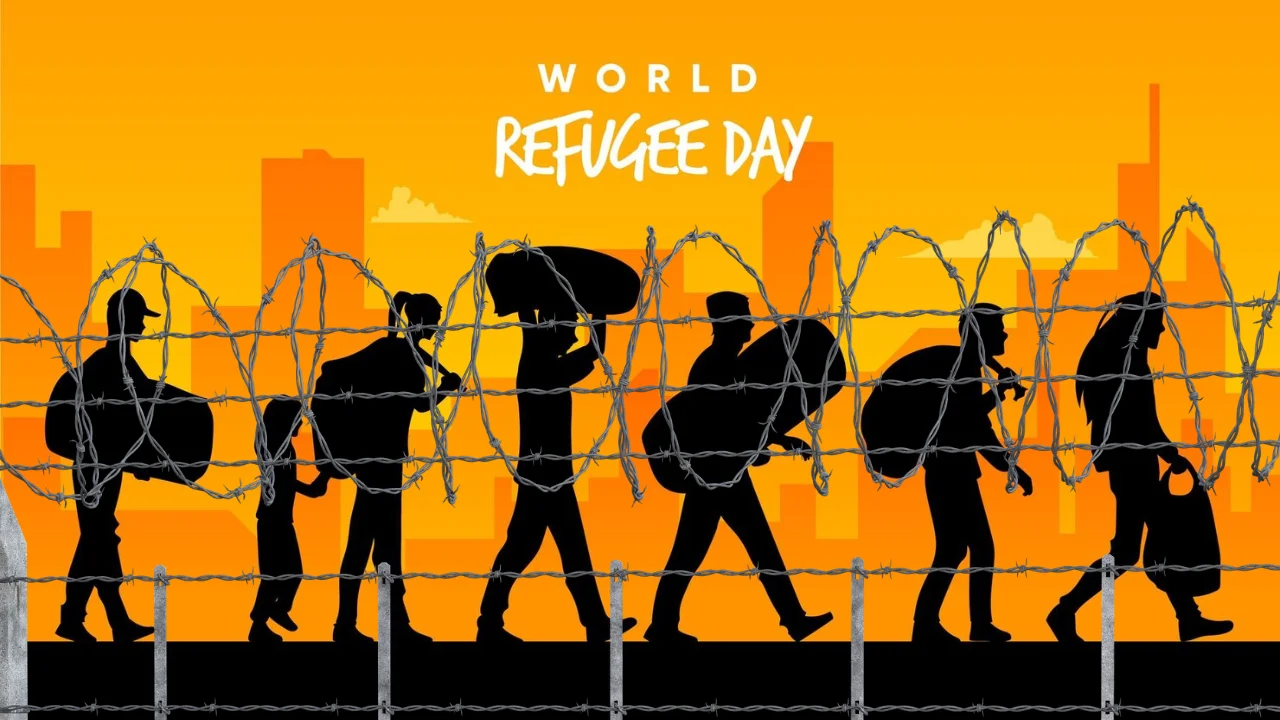World Refugee Day 2024
World Refugee Day is a special day recognized by the United Nations to show respect and appreciation for refugees worldwide. It takes place on June 20th every year. It is a time to acknowledge the bravery and determination of individuals who have been compelled to leave their homeland due to war or mistreatment.
This day encourages us to empathize with their struggles and hardships and to acknowledge their strength in starting anew and creating a better future for themselves. World Refugee Day serves as an opportunity to foster compassion and awareness, promoting a greater understanding of the challenges faced by refugees and their remarkable resilience in overcoming adversity.
World Refugee Day Theme 2024
The official theme for World Refugee Day 2024 is “For a World Where Refugees Are Welcomed”.
Refugees need our solidarity now more than ever. Solidarity means keeping our doors open, celebrating their strengths and achievements, and reflecting on the challenges they face.
Solidarity with people forced to flee also means finding solutions to their plight – ending conflicts so they can return home in safety, ensuring they have opportunities to thrive in the communities that have welcomed them, and providing countries with the resources they need to include and support refugees.
Difference between a refugee and a stateless person
A refugee is an individual who has been forced to leave their home and country due to a genuine fear of persecution based on factors such as race, religion, nationality, membership in a particular social group, or political opinion. This definition was established by the United Nations 1951 Refugee Convention. Refugees often seek exile to escape the consequences of natural or man-made disasters.
On the other hand, stateless persons are individuals who lack a recognized nationality and do not belong to any country. Statelessness often arises from discriminatory practices targeting specific groups. As a result of not having official identification, such as a citizenship certificate, stateless individuals may face barriers in accessing crucial government services like healthcare, education, or employment. They are often excluded from the rights and privileges granted to citizens.
History of World Refugee Day
World Refugee Day is an international day observed annually on June 20. It was proclaimed by the United Nations General Assembly in 2000 to commemorate the 50th anniversary of the 1951 Convention relating to the Status of Refugees and the 1967 Protocol. The day is an opportunity to raise awareness of the plight of refugees and to celebrate their resilience and courage.
1951 Refugee Convention and its 1967 Protocol
Refugees, who are among the most vulnerable individuals worldwide, benefit from the protection provided by the 1951 Refugee Convention and its 1967 Protocol. These international legal instruments address crucial aspects of a refugee’s life and rights.
- They ensure that refugees, at a minimum, receive the same treatment as other foreign nationals in a given country and, in many cases, the same treatment as nationals.
- The 1951 Convention establishes various rights for refugees and emphasizes their obligations towards the host country.
- Central to the Convention is the principle of non-refoulment, which prohibits the return of a refugee to a country where their life or freedom would be at serious risk.
- This protection may not be granted to refugees who are reasonably considered a threat to the security of the country or who have been convicted of particularly serious crimes and pose a danger to the community.
These legal frameworks play a crucial role in safeguarding the rights and well-being of refugees while outlining their responsibilities towards their host countries. By upholding the principle of non-refoulment, the Convention ensures that refugees are protected from harm and are allowed to rebuild their lives in safety and dignity.
The rights contained in the 1951 Convention include
- The right not to be expelled, except under certain, strictly defined conditions;
- The right not to be punished for illegal entry into the territory of a contracting State;
- The right to work;
- The right to housing;
- The right to education;
- The right to public relief and assistance;
- The right to freedom of religion;
- The right to access the courts;
- The right to freedom of movement within the territory;
- The right to be issued identity and travel documents.
Some basic rights, including the right to be protected from refoulment, apply to all refugees. Refugees become entitled to other rights the longer they remain in the host country, which is based on the recognition that the longer they remain as refugees, the more rights they need.
Significance of World Refugee Day
- World Refugee Day serves as a platform to raise awareness about the rights, needs, and aspirations of refugees.
- It plays a crucial role in mobilizing political support and resources to ensure that refugees not only survive but also have the opportunity to thrive.
- The day draws attention to the challenges faced by refugees and the importance of providing them with protection, assistance, and opportunities for a better future.
- By highlighting their stories and advocating for their rights, World Refugee Day aims to foster empathy, solidarity, and collective action to improve the lives of refugees worldwide.
20th June 2024 Special Day
20th June carries global humanitarian significance as the United Nations commemorates World Refugee Day in 2024. Coinciding poignantly with the summer season annually, this observance confronts the stark reality of individuals displaced forcibly worldwide. The unique timing provides an opportune moment to catalyze efforts protecting refugee rights while spreading awareness of their plight. As activists and communities stand in solidarity internationally on this particular 2024 date, the message resonates clearly – refugees deserve our respect, empathy, and support.
- Indian Bank Recruitment 2025 Out for 1500 Apprentice Posts
- Indian Bank Apprentice Salary 2025, Pay Scale, Salary Structure
- Indian Bank Apprentice Syllabus & Exam Pattern 2025, Check Details
- Railway RPF Syllabus 2024, Check Exam Pattern, Topic And Syllabus
- SSC JE vs RRB JE, Which Is Better? Know Detailed Comparison
- SSC CGL Study Plan 2025 For Next 25 Days With Tips, Tricks

Hello, I’m Aditi, the creative mind behind the words at Oliveboard. As a content writer specializing in state-level exams, my mission is to unravel the complexities of exam information, ensuring aspiring candidates find clarity and confidence. Having walked the path of an aspirant myself, I bring a unique perspective to my work, crafting accessible content on Exam Notifications, Admit Cards, and Results.
At Oliveboard, I play a crucial role in empowering candidates throughout their exam journey. My dedication lies in making the seemingly daunting process not only understandable but also rewarding. Join me as I break down barriers in exam preparation, providing timely insights and valuable resources. Let’s navigate the path to success together, one well-informed step at a time.






